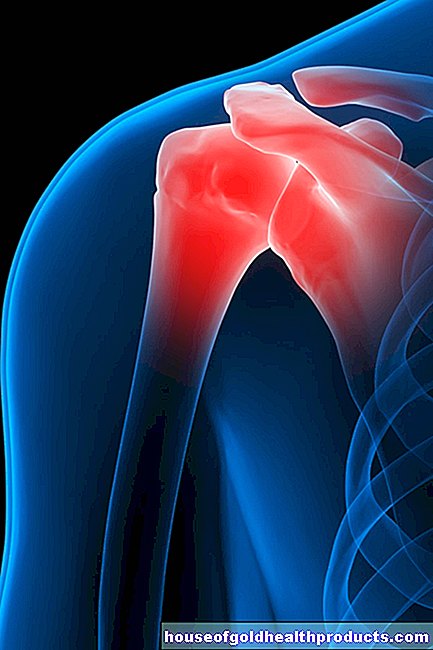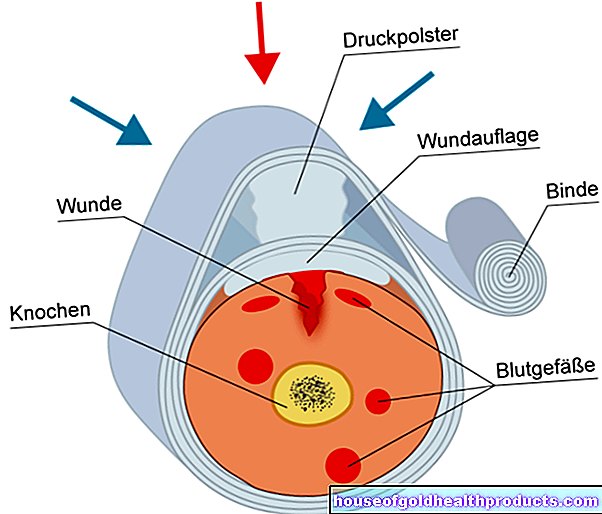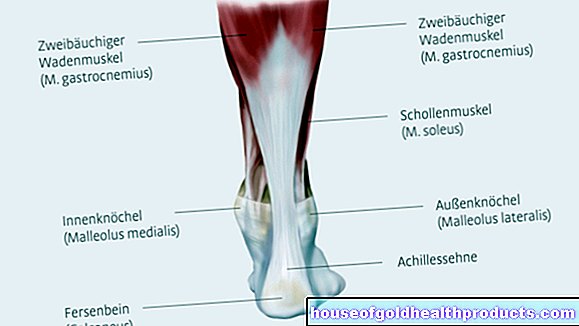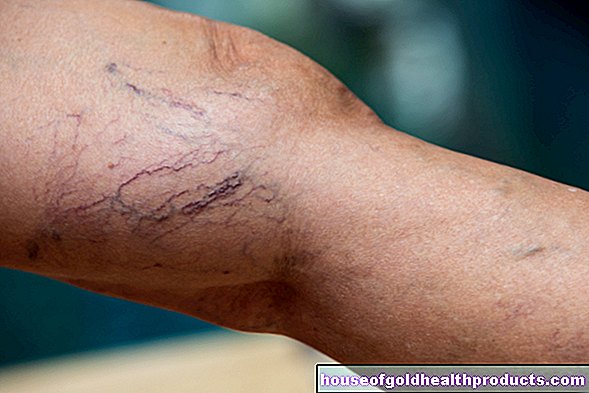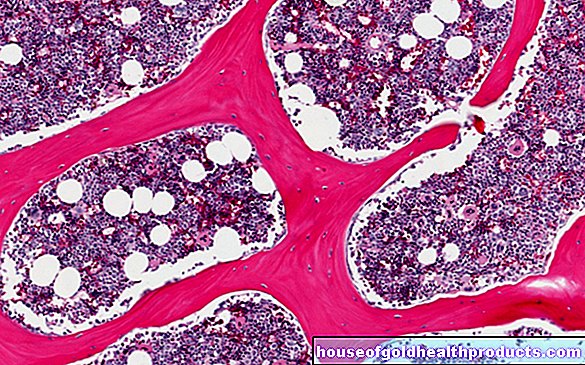eating disorder
Eating disorders are serious mental illnesses. Control over eating behavior is lost - even for anorexic people who can no longer stop not eating. Eating disorders therefore actually have an addiction-like character. The physical damage is also often serious. Here you can find out everything about eating disorders, who is particularly at risk, how they can be recognized and which treatment is important.
In addition to eating behavior, the relationship to one's own body image is often disturbed in eating disorders - those affected vehemently reject it or subject it to strict diets and sports programs. As a rule, self-acceptance is disturbed and dominated by the current body weight.
For those affected, eating disorders such as anorexia, bulimia or binge eating disorder are associated with great psychological suffering. The disturbed eating behavior can also cause considerable physical damage. Most of the time, professional help is needed to overcome an eating disorder.

What types of eating disorders are there?
There are three main forms of eating disorder, which can also be mixed or alternated.
Anorexia nervosa is the best known, but also the rarest form of eating disorders. 14 out of 1,000 girls and women and 2 out of 1,000 boys and men suffer from it. Those affected eat extremely little food. In addition, some exercise excessively. Accordingly, they rapidly lose weight. About 15 percent of the sick die.

Bulimia (addiction to eating and vomiting) is characterized by binge eating, after which those affected vomit up the food they have eaten. Since they do not always do this, or some of the food gets into the intestines during the binge eating, those affected are often not thin, but sometimes even overweight and do not attract attention from the outside. 19 out of 1,000 girls and women and 6 out of 1,000 boys and men suffer from bulimia.

Binge eating disorder is the most common eating disorder. Those affected consume significant amounts of calories during a binge eating. This affects 28 out of 1,000 girls and women and 10 out of 1,000 boys and men. A special form is the night-eating syndrome with nocturnal binge eating.

Rare eating disorders
There are also more less common types of eating disorders:
People with orthorexia only consume foods that they think are healthy. If the choice is severely limited, there is a risk of malnutrition. In addition, the restricted eating behavior can provoke social conflicts.
The avoidant-restrictive eating disorder, which usually begins in childhood, can have a similarly devastating effect. Those affected reject certain foods because of their color, consistency or smell. This can result in severe malnutrition and underweight.

Symptoms of Eating Disorders
When you have an eating disorder, your thoughts revolve almost constantly around eating or not eating. Other possible signs of an eating disorder are
- uncontrolled binge eating
- complicated eating rituals
- secret food
- Excuses for not having to eat
- Induced vomiting / laxative abuse
- Rejection of your own body
- severe fear of gaining weight
- compulsive weight control
- excessive exercise
Often, but not always, an eating disorder is reflected in being severely underweight or overweight. However, not everyone who loses weight or is very afraid of gaining weight is anorexic. And not everyone who overeat now and then suffers from binge eating disorder.
In fact, the transition from abnormal to abnormal eating behavior is fluid. Often an eating disorder develops gradually. If you observe signs of behavioral disorders in eating behavior, you should take them seriously and seek advice.


Eating Disorders in Children
Most of the time, when you think of eating disorders, you think of young people from puberty onwards. But eating disorders can also occur in childhood.
These include classic eating disorders such as anorexia and binge eating - with all the symptoms that one is also familiar with from adults. On the other hand, psychologists very rarely observe bulimia in childhood.
"Picky Eating" primarily affects preschoolers. The children then stiffen up on certain foods or refuse whole food groups such as vegetables or foods of a certain color.
The behavior goes far beyond the typically picky eating behavior of younger children. Psychologists refer to the phenomenon as an avoidant / restrictive eating disorder. Rejection of food sometimes turns into fear. It also becomes critical if the children do not develop in accordance with their age, underweight or other deficiency symptoms occur.
Pica syndrome also occurs predominantly in childhood. The little ones devour things like stones or paper. Naturally, this can cause considerable health problems.

Causes and Triggers for Eating Disorders
The causes of eating disorders are complex. There are diverse biological, individual, familial and social factors that work together in very different constellations.
Biological causes: As with all mental illnesses, there is also a genetic predisposition to eating disorders that favors the onset of the illness. An unfavorable interaction of hormones or neurotransmitters in the brain could also contribute to eating disorders.
Individual causes: People with eating disorders often have unstable self-esteem and are insecure. Anorexia, for example, then conveys the feeling of maximum control - at least over one's own body. The extreme level of discipline that is necessary to starve like this also corresponds to the high performance standards and perfectionism that drives many anorectics.
For other eating disorders, overeating helps relieve stress and experience short-term relief. This is followed by increased self-hatred. Traumatic experiences like sexual abuse can also cause an eating disorder.
Family causes: In the past, the family, especially the mother, was primarily held responsible when a child developed an eating disorder. This simple idea is long out of date. However, there are factors in the family that make eating disorders more likely.
For example, when negative feelings and conflicts are suppressed, when the parents control the child too much or have high expectations for their daughter or son. But even if the child has to bear too much responsibility - for example if the parents separate or one parent falls ill, this can contribute to an eating disorder.
Ultimately, it is also decisive with which attitude mother or father approach their own body - whether they have a more relaxed or non-relaxed relationship to food and whether they accept or criticize the child in its physicality.
Sociocultural causes of eating disorders: Women in particular are still judged strongly based on their external attractiveness - and that means conforming to the prevailing ideal of beauty. Appearance is becoming increasingly important for men too. Ideals of beauty can make insecure people even more insecure. To conform to the ideal at some point appears to be the solution to all problems.
Those who do not fit into the grid often suffer from exclusion and bullying. Conversely, young people who lose weight often experience being admired for it. A diet can be the starting signal for anorexia. For others who experience constant rejection, eating becomes the most important way to experience positive feelings.
Diagnosing eating disorders
As with all mental illnesses, there are currently no physically measurable parameters for a diagnosis. It is therefore based on the assessment of psychiatrists and psychotherapists with appropriate expertise. In addition to the impression that you derive from the personal interview, the diagnosis is based on answering standardized questionnaires that deal with typical symptoms.
A general definition of eating disorders is therefore also impossible. Read more about this in the respective specialist texts on the individual eating disorders!
Eating disorders - possible consequences
Anorexia starves the entire body. The result is massive physical damage. These include muscle wasting, brittle bones (osteoporosis) and hair loss. In severe cases, internal organs are damaged, especially the heart. The immune system is also attacked. Women do not menstruate and become sterile. Men suffer from loss of potency.
Bulimia brings other problems with it. This includes mechanical and acid-related damage to teeth and esophagus. The entire gastrointestinal system is affected. Repeated vomiting also upsets the electrolyte balance.
Binge eating, on the other hand, can lead to significant weight gain, with all the consequences of being very overweight: high blood pressure, diabetes, joint problems.
Perhaps the worst effects of eating disorders affect the soul. Ultimately, every eating disorder is directed against your own body - and against your own self.
Therapy of eating disorders
Overcoming an eating disorder is difficult. The deep-rooted fear of gaining weight while eating normally is a massive barrier for anorectics and bulimics. And for all those affected, the eating disorder is an anchor that stabilizes their life - albeit in an extremely harmful way. Letting go of it requires great courage and patience for the development of alternative stabilization strategies, the development of a positive worldview and trust in one's own strength.
All of this can be created within the framework of psychotherapeutic treatment. The treatment is not only aimed at daring healthy eating behavior and maintaining it over the long term. In particular, self-acceptance is strengthened and beliefs that cause illness are dissolved.
Therapeutic help
Therapy is a process that takes a long time, especially in the case of long-standing eating disorders. One-on-one therapeutic discussions are important for this, in which those affected uncover causes with the help of the therapist and develop alternative coping strategies.
Meeting other people affected is just as important as part of group therapy. There those affected meet people who can understand from their own experience what an eating disorder means. In exchange, you benefit from successful solution strategies or experience encouraging reports from those affected who are further than you in coping with the eating disorder.
Outpatient or inpatient treatment?
Depending on the severity of the disease, the therapy is outpatient, in day clinics or inpatient. A longer stay in hospital is usually unavoidable, especially with severely anorexic patents. Weight loss is so life-threatening for some that supplying the body is the first priority.
Long-term follow-up care: Follow-up care is also crucial. Many sufferers fall back into their old eating habits, especially under stress. Long-term participation in a self-help group makes a decisive contribution to stabilizing the success of the therapy.




